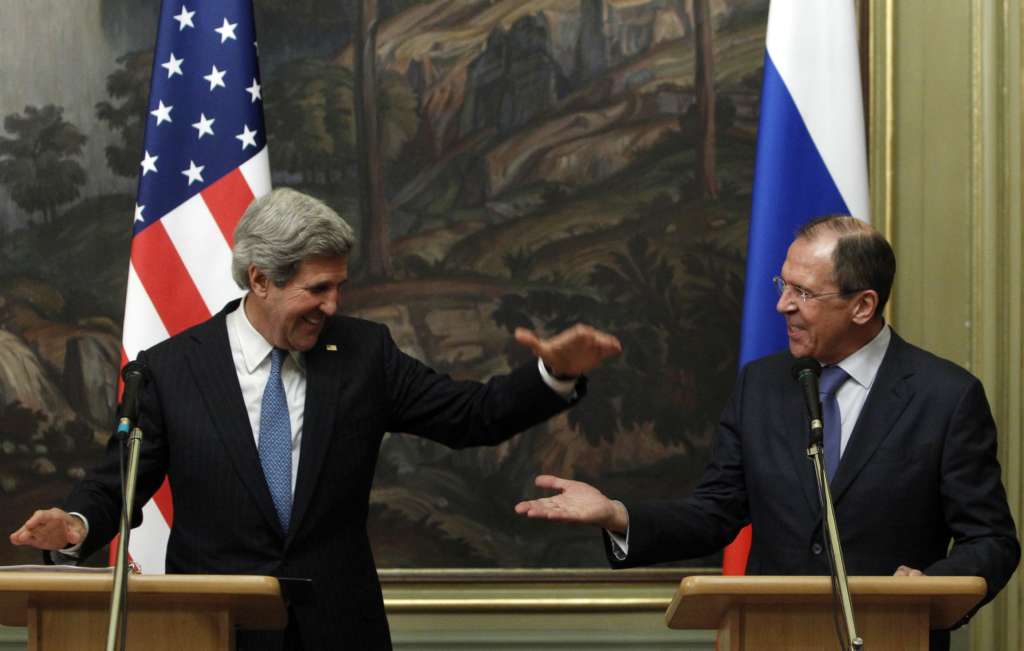Paris – A new agreement to break up the Syrian crisis solution into several phases was reached between U.S. Secretary of State John Kerry and his Russian counterpart Sergei Lavrov, during Kerry’s visit to Moscow earlier this month.
Asharq al-Awsat newspaper received detailed information on the bilateral meeting, which saw an agreement to deal with the ongoing Syrian crisis in separate phases, beginning with military cooperation on airstrikes against the ISIS and Nusra front.
Well-informed European sources briefed Asharq al-Awsat on the report presented by Kerry to EU foreign ministers in Brussels on the outcome of his recent visit to Russia, where he held extensive meetings with Lavrov and Russian President Vladimir Putin.
The sources said that Kerry seemed to be optimistic with regards to the agreement reached in Russia, which provoked “surprise” among some EU ministers due to Moscow’s previous dealing with the Syrian file and its attempt to link a solution to the Syrian crisis to other pending issues with Washington, including the crisis in Ukraine and NATO’s increasing military presence along the borders with Russia.
During the meeting in Brussels, Kerry told the attendees that he agreed with Lavrov on breaking up a solution to the Syrian crisis into several phases, the first being U.S.-Russian military cooperation on airstrikes against ISIS and Nusra Front.
Such cooperation can only be launched when the moderate opposition’s military points are separated from Nusra’s locations, according to Kerry.
Diplomatic sources told Asharq al-Awsat that Kerry wanted to secure guarantees from his Russian counterpart that both sides would agree on the objectives and timing of airstrikes. The sources added that such measures would impose some limitations on Moscow’s military intervention, as western and Gulf parties accuse the Russian state of intentionally targeting the moderate opposition to support Syrian President Bashar Al-Assad’s regime.
The plan, which was conveyed by Kerry to his European counterparts, and which was reached after 12 hours of intensive discussions with Lavrov, consists of creating a U.S.-Russian “joint operation room” in the Jordanian capital to supervise military operations in Syria. However, such step would irritate Iranian authorities, as a joint operation room was already established in Baghdad to coordinate airstrikes launched by Russia, Iran and Syria.
The sources added that Washington agreed to coordinate military airstrikes with Moscow, provided that the latter refrains from attacking the moderate opposition, which is fighting the Syrian regime and ISIS at the same time. In fact, the U.S. accuses Russia of targeting military groups that are trained and armed by Washington within a program launched by the Central Intelligence Agency (CIA) to support the Syrian opposition.
According to the same sources, the U.S. wants Russia to exert pressure on Assad to stop targeting the moderate opposition, or at least the civilians.
In addition to military cooperation, Kerry told his European counterparts that he agreed with Lavrov on reviving talks led by U.N. Special Envoy for Syria Staffan de Mistura. French sources told Asharq al-Awsat that the latter was being pushed by Washington and Moscow to hold a third round of talks in Geneva.
The U.N. envoy was quick to respond by announcing earlier this week that a new round of intra-Syrian peace talks might be held towards the end of August. He also expressed hope that the U.S. and Russia would make “concrete progress” in order to improve the atmosphere for the resumption of discussions.
Previous rounds of talks this year stalled as fighting has escalated in Syria, particularly around Aleppo.
However, De Mistura noted in a news conference held on Tuesday that the resumption of peace talks would not wait until the situation in Aleppo and Damascus sees some improvement.
On a different note, sources said that Kerry told his European counterparts that discussing the fate of Bashar Al-Assad would be postponed to later stages, noting that a solution to the Syrian crisis could only be political through an agreement with Russia.
The same sources said that Moscow would not accept to engage in meaningful negotiations unless it gets reassurances on preserving its interests in Syria and securing the presence of a trusted person who would succeed Bashar Al-Assad.
Consequently, the European sources believe that the Kerry-Lavrov agreement would be “difficult to implement”, adding that the Syrian regime, backed by Russia, Iran and the armed militias, would continue maneuvering to prevent the holding of negotiations in Geneva until the achievement of its objectives in the war arena, especially in Aleppo.
The European sources concluded by saying that the efforts currently deployed by the U.S. administration represent the last attempt to resolve the ongoing crisis. They added that if Russia failed to exert pressure on the Syrian regime and Iran to implement the bases of the agreement, then Washington would completely withdraw from the Syrian file, leaving to Moscow the burden of dealing alone with the crisis.
